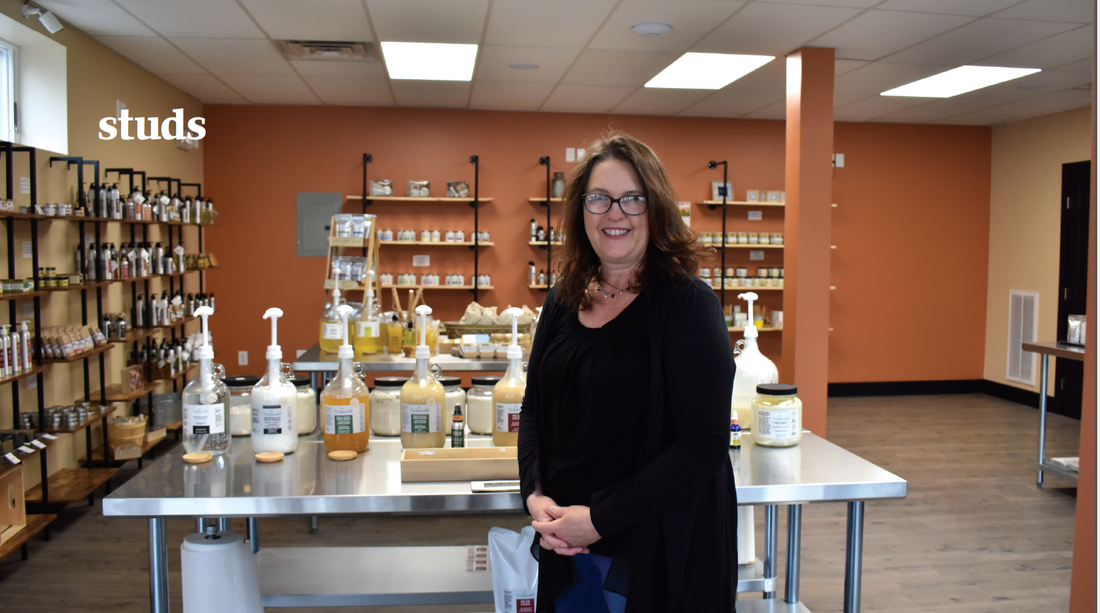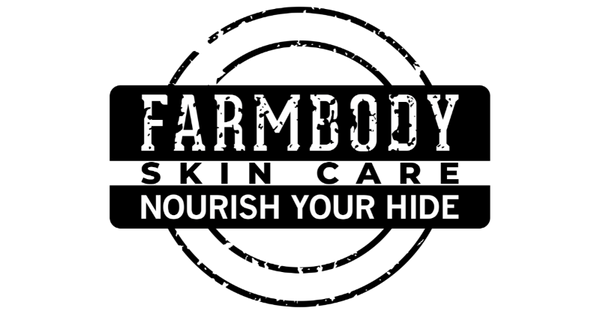
The ingredient sleuth
Share
Disturbed by the ‘sneaky’ chemicals in skincare products, she started making her own. Now she’s going after plastic packaging.
After itchy, oozing skin on her hands threatened this single mom’s livelihood as a medical massage therapist, she made it her mission to figure out what was going on. “So many people’s doctors are telling them they have eczema,” said Cindy Allyn, but that’s really a catchall term for a whole category of skin irritations. The problem, she explained, often turns out to be an allergy to one of the hundreds of chemicals we come into contact with daily.
She drilled down, pinpointing a handful of irritants, like the nitrile gloves she’d been wearing to work through eczema flare-ups; the formaldehyde releasing preservatives in her dermatologist-prescribed steroids creams – which also turn out to be common ingredients in everyday products like laundry detergent, dish soap and shampoo. “We’re not dead yet. Formaldehyde shouldn’t be touching us,” said Allyn, with a giggle. “Once you start sleuthing and you see all of the things that could be irritating you, it’s pretty disturbing.”
Eighteen years later, Allyn is showing a reporter around her week-old store, the Sustainafillery, on the main drag in Florida, where the Butterme- up Buttercup hand cream she came up with to heal her own hands remains a best-seller. Her creams are arrayed in growlers with pump tops, ready for customers to fill their own reusable containers. This is a different kind of store: a “refillery,” common in places like Brooklyn and Colorado, but the first of its kind in Orange County, NY. Allyn, however, wants to be more than just another zero waste store. That she makes her own products in her lab, a 2,000-square-foot space around the corner from the store, gives her an agility unique in the field. Eventually, she hopes to supply other refill stores – likes those in New Paltz, NY and Sparta, NJ - with high quality, locally made skincare. Interview by Becca Tucker
Talk about the sleuthing you did to save your hands all those years ago. When I was young, my grandmother had an allergy testing business in New Jersey, so I grew up knowing that people have allergies to different substances that can be bothering you. Of course it was a simpler time, we didn’t have as many chemicals floating around as we do now. But I went back to my basics, because nothing was helping. So I looked up all the chemicals of everything that I knew I was coming into contact with, to see if there were any known skin irritants in them. It’s sneaky, these things are very sneaky. Sometimes we don’t know what’s causing problems, but we can take charge of our health by learning more and trying new things. A lot of times people, once they get off all the chemicals, they get better.
How did you go from ingredient sleuth to creator of your own line of skincare?
The first thing I developed was a cream to restore my microbiome. I discovered fermented
lactobacillus, the healthy bacteria we’d find in a yogurt, and I preserve my products in that.
That gives everything a one-year shelf-life, and that’s all we need. If you’re using something, you’re going to be fine with a oneyear shelf life. It’s an expensive ingredient to use to preserve with, so you’re not going to find the big corporations using it. They’re not interested in your skin, they’re interested in the bottom line. So it’s left to small makers to try and solve people’s problems. I did it for me, and then customers started wanting it. I owned a salon, and we were using it for manicures and pedicures.
You call your skincare line Farmbody. I feel a nod to the black dirt in the name? Yeah,
my spa was in Pine Island, I was surrounded. One of my customers actually came up with
the name of the product line for me while we were doing her nails.
What are some local ingredients you use?
Goat milk, honey. Goat milk has natural lactic acid in it so it exfoliates your skin gently.
What’s a myth that needs busting? For people that are thinking they’re doing better
by buying Seventh Generation laundry detergent, I mean, it gets a grade D from the
Environmental Working Group. So does Tide Free and Gentle. I had a sneaking suspicion about that. Yeah, it’s all greenwash. When you start to look, they have all these skin irritants. For something that’s supposed to be “free and clear,” you’re not supposed to have allergens in it – it gets me nuts. Other than that, you’re going to have environmental concerns. The amount of things in here that cause aquatic toxicity for our waterways….
We’ve got our own laundry detergent we’re making from scratch, and there’s nothing in
here that’s going to hurt the environment. We make 100 percent coconut-oil soap from
organic coconut oil. We grind it into a powder, add washing soda, baking soda, a mixture of sea salts and citric acid. All things that are naturally occurring, and it gets your clothes
clean. That’s fragrance free; if you want a fragrance you can mix it up: lavender, citrusy.
Where have you done most of your learning?
I read a lot, research a lot. Where? There’s a lot of government sources where you can trust information – supposedly [laughs]. The same FDA that’s telling us that polysorbate 80 [an additive in processed food that research suggests can trigger allergies and promote gut inflammation] can be in your pickles, yeah okay. But you read, and read through the lines, and do your research.
What did you go to school for?
I went to school for massage. That’s it, just a mom. Nothing just about being a mom. My daughter’s a chemist, my son’s an engineer, so we’re all science-minded. My grandmother ran the allergy-testing company; my father was a chemist at American Cyanamid [which became Pfizer]. So we’re all just kind of science minded people, and curious. I just need to know: where does that come from, what does it do?
Is there a lot of trial and error involved in the making process?
Not too much, because once you understand the ratios of what you’re using, and the properties of all the oils and ingredients, I’ve got it down to being able to formulate something pretty quickly.
Occasionally something can give me a little grief and we just troubleshoot it until we get it right. People have been asking me to make shampoo for their dogs. So I’ve got my first
customer coming for that this weekend. They wanted a liquid dog shampoo that doesn’t
have any of the bad stuff in it. Once you know the proper pH the product should be for the dog’s skin and hair, then I can formulate something in that range.
Is somebody back at the lab now, working?
Yes, [Peter Neuman] is there every day. He was a chef and one of my customers. He just wanted to help me, he saw me growing, he was looking for something new to do. I was like, well if you can wield a stick blender to make soup, you can make soap. Let’s give it a shot. He’s very regimented, too, because when you have a restaurant you know what it is to prep, you know what it is to keep track of things, so he’s already in that groove. Then the other two [part-timers], they’re teenagers after school. They’ll put labels on, they’ll shrink wrap things, they’ll trim up the soaps. There’s a big space between the doctor’s office and the everyday little health issues that need troubleshooting.
Do you feel you’re helping fill that gap?
Well, it came from doing nails. If I’m seeing the same people over again every three weeks, I’m talking to you, I’m learning about you, you’re sharing things with me, you’re trusting me because I’m seeing you, we’re exchanging things, and you get to know people. Really, it’s developed over time – oh, this happens to you? Well, what are you using? People will go home and text me a picture of the ingredients of what’s in there. I’ll look at it and go, Eh, it could be coming from this, what else in the house do you have that has that? So I’m helping people do their own detective work. I can tell you what could be the culprit, what you should try to avoid, give it a month, what do you got to lose?
Your price point is higher than typical drugstore fare. Do most of your customers come in with a glaring skin issue, or are they just environmentally minded?
There’s the customer who stumbles upon me and says, Oh my God that smells great, I have to have that. Never looks at the ingredients, doesn’t have any problems, just wants
something that smells great. And then there’s the customer and they’ll come up to my booth and I’ll look at their hands or I’ll look at their face… you don’t want to be jumping on people, like, I can help you get rid of that! It’s a subtle: Are there any issues you have with your skin? More often than not people will come up seeking help: eczema is the thing I hear the most.
Eczema, psoriasis, itchy scalps, itchy skin, dry, or acne – acne’s a huge one. And I’ve gotten people off their acne medication, and I’ve gotten rid of people’s acne scars. But the FDA says you can’t make these claims. The whole thing about natural skin care is we all know we can solve problems but you have to be careful about what you’re saying on your package. That’s frustrating. Because then you have the supplement industry, it seems like they can say anything and then they have that little disclaimer: Not evaluated by the FDA. And I’m like, well why can’t we do that for skin care? That’s one of the frustrations: how do you safely navigate what to say without getting in trouble, yet help people.
